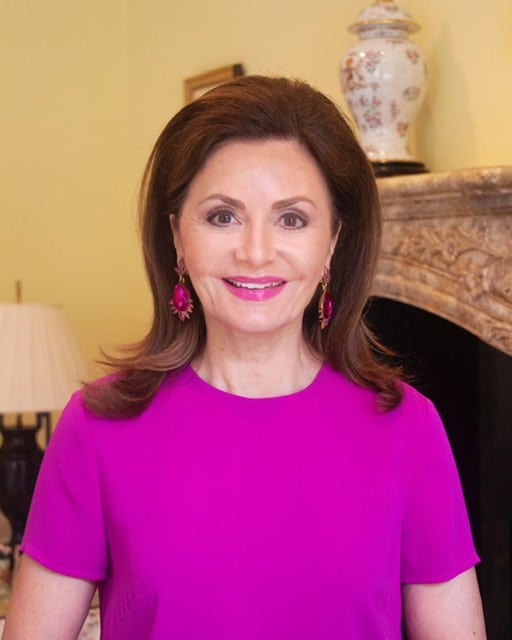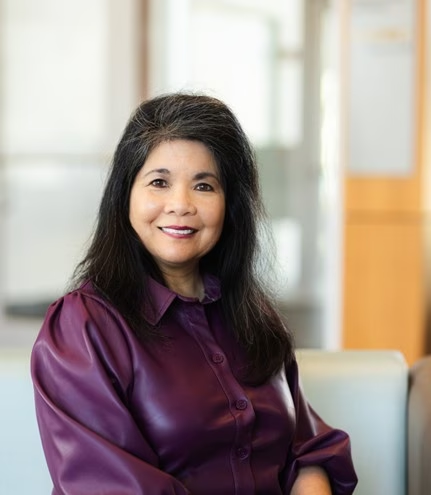Meet Callier Ambassador Co-Chair Melinda Knowles

1. How did you first learn about the Callier Center for Communication Disorders?
I learned about the Callier Center through my dear friend and Callier Foundation board member, Beth Thoele.
2.What inspired you to become involved with Callier’s mission?
I was drawn to Callier on the same day by two special people: I was invited by Beth Thoele to join her at the Callier luncheon. Once there, I had the pleasure of seeing an old business colleague and friend, Richard Neely, an Emeritus Trustee of Callier. Hearing his history of involvement with the center was impactful to me. Hearing Richard’s story along with the testimonies of other Callier patients and parents of patients, which were so exemplary of the important services that Callier provides to our community, I knew I wanted to be involved.
3.Why do you want to help Callier patients and raise awareness for hearing loss and communication disorders?
Communication is the backbone of human relations. Hearing others communicate with us, being able to communicate in a way to be understood as an individual, and the ability to decipher communication are what give all of us a fulsome life. What could be more important? I feel anything we can do to raise awareness about these issues and help improve others quality of life is a mission worth having.
4. Why is philanthropy important to you?
My philosophy on philanthropy has its foundation in my faith. I believe to whom much is given, much will be required. Responsibility is spiritual wealth. We are put on this earth to be the feet and hands of God. I do my best to live this.
5. What makes you excited to co-chair the Callier Ambassador group this year?
Firstly, I am so happy to be able to work raising community awareness of the marvelous work being done at Callier and bringing more friends into involvement and support. Also, selfishly, I am excited to have the opportunity to co-chair with my dear friend, Nancy Gopez.
6. What are you looking forward to this coming Ambassador season/year?
I am looking forward to coming up with fun venues for gatherings, bringing along new friends to the Ambassador group, and hearing about all the different services Callier offers to its patients. The talks are always so enlightening!
7.Why should someone get involved with the Callier Center and become a Callier Ambassador?
The Ambassador group offers an excellent opportunity to learn more about the services offered and research being done at the Callier Center in the areas of communication disorders and hearing loss. Once one understands how impactful to our community the work at Callier is, everyone will be moved to support Callier and to become an Ambassador.
Meet Callier Ambassador Co-Chair Nancy Gopez

1. How did you first learn about the Callier Center for Communication Disorders?
I was invited to attend the Callier Luncheon with Beth Thoele. I loved hearing the honorary family speak about how Callier helped them. Hearing about Callier’s impact and learning more about its mission and programs left a lasting impression on me.
The Callier Center brings together clinical care, education and groundbreaking research in the field of communication disorders. It is nationally recognized for its work in speech-language pathology and audiology. Its leading-edge research advances the understanding of many communication disorders and explores neurological links to conditions such as autism and age-related cognitive decline.
2. Why do you want to help Callier patients and raise awareness for hearing loss and communication disorders?
Communication is essential to connecting with people. For those with hearing loss or communication disorders, daily conversations can become isolating and frustrating.
I feel it’s important for patients at the Callier Center to be able to correct hearing loss or learn how to communicate so that they can feel connected to their family, friends and communities. Also, it’s crucial to raise awareness, letting those impacted know that help is available at Callier.
3. Why is philanthropy important for you?
In order for Callier to continue offering exceptional programs as well as stay on the cutting edge of research in hearing loss and communication disorders, support through grants and private donations is essential. I am glad for the opportunity to contribute personally as well as support fundraising efforts for Callier because it is a cause that means a great deal to me.
4. What makes you excited to co-chair the Callier Ambassador group this year?
Since it started two years ago, the Callier Ambassador group has hosted a series of informative breakfasts featuring exceptional speakers that help our guests better understand various communication disorders.
I’m excited to work with Melinda, the Leadership Circle and staff to continue growing Callier’s Ambassador group and offering these meaningful events. Auxiliary groups like ours offer a wonderful way for people to get involved with Callier and support its mission. I’m also thrilled to be co-chairing the Ambassador group with Melinda, and I look forward to what we’ll accomplish together.
5. What are you looking forward to this coming Callier Ambassador season/year?
I’m excited to build on the incredible momentum Megan Steinbach has created over the past two years in growing our Ambassador group. I also look forward to co-chairing with Melinda and collaborating with our Leadership Circle as well as the dedicated staff, who help plan our breakfasts and ensure we continue offering meaningful and engaging topics to our guests.
I’m especially excited about bringing back our evening event, which was such a fun and successful highlight last year.
6. Why should someone get involved with the Callier Center and become a Callier Ambassador?
Being a Callier Ambassador is a wonderful way to connect with others, learn about the wide range of programs Callier offers and deepen an understanding of communication disorders. It’s also a meaningful way to support Callier and help further its important mission.
2023-2025 Callier Ambassador Chair

Meet Callier Ambassador Chair: Megan Steinbach
How did you first learn about the Callier Center for Communication Disorders?
“I heard about Callier through two sources: our ENT [ear, nose and throat] as well as through a Callier Foundation board member, Beth Thoele.”
How old was your child when they first came to Callier? What was their diagnosis?
“At the age of three, my son was diagnosed with moderate hearing loss in both ears. We initially uncovered this during his 3-year wellness visit with his pediatrician due to speech delays. We underwent a series of tests with our ENT, including an ABR [Auditory Brainstem Response] test, and then were referred to a hearing specialist. Ultimately, we connected with Dr. Richards at the Callier Center for Communication Disorders, who completed a full evaluation and fitted Lucas for hearing aids.”
What is one thing that your child does today that you would have never imagined them doing when they first started coming to Callier?
“Lucas, now 10 years old, is incredibly confident with his hearing aids and is an advocate for himself and his hearing in the classroom and in sports.”

How has Callier improved your child’s life? Your life as a family?
“Dr. Richard’s is the main reason for that confidence – from being the most patient doctor with a three-year-old in an audio booth who wanted to do anything other than listen, letting him get comfortable with the molding clay that they used to make his earmolds, to encouraging us as parents to allow Lucas to choose ALL the bright colors for his earmolds so that he would be proud to wear them. Since we first started at Callier, Lucas has had almost every color of earmold you could imagine, including marbled with multi-colors. Each time, he was excited to get his new molds and proud to wear them. It helped immensely as he became comfortable and confident talking about his hearing aids with his classmates.”
Why was it important for you to chair and launch the Callier Ambassador group?
“I initially thought of Callier as an amazing place that helps children who have hearing loss. As I have gotten more involved, I have been amazed to learn about the range of services and expertise in the areas of speech-language, autism spectrum disorder services and hearing services that are available for both children and adults. I am so excited about the Callier Ambassador group, as I believe it is an opportunity to shine a light on the phenomenal work being done by the Callier team and share this information throughout our community. I also want the community to understand how the Callier Foundation ensures that EVERYONE has access to these life-changing services and technology.”
Why should someone join the Callier Ambassador group?
“This is an excellent opportunity to learn more about the research being done in the areas of communication disorders and hearing loss. Additionally, to understand how Callier is impacting research and leveraging it for their patients and beyond. I hope that everyone will be moved to support Callier to ensure that no matter someone’s socio-economic status, individuals can access the life-changing resources and services offered.”
Interested in learning more about the Callier Ambassador group? Learn more.